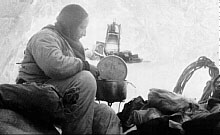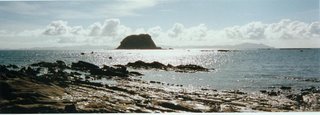– W. H. Auden
Here's a thematic breakdown of the 110 poems in our Classic NZ Poets in Performance anthology (Auckland: AUP, 2006). The categories are pretty subjective, and could undoubtedly be improved on. Not a bad starting point for discussion, though: what's the poem really about?
ADOLESCENCE
[Adcock’s “Camping” speaks for itself. Campbell’s “Gunfighter” is definitely having trouble growing up, even if he isn’t actually an adolescent. Wendt’s poems from The Book of the Black Star (AUP, 2002) are clearly about a great many things: depression, friendship, etc. but it was hard to think of any other heading to put them under].
Fleur Adcock: Camping - 89
Alistair Te Ariki Campbell: The Gunfighter - 60
Albert Wendt: On Our Way - 115
Albert Wendt: Over Ponsonby - 116
Albert Wendt: Scavengers - 116
Albert Wendt: Bus - 117
ANIMALS
[The poems here may actually be about love, death and a number of other subjects, but animals star in all of them].
Peter Bland: Death of a Dog - 93
Lauris Edmond: yellow-eyed penguin - 47
Janet Frame: The Cat of Habit - 50
Brian Turner: Fish - 133
Brian Turner: Pig - 134
Brian Turner: Trout - 131
CHILDREN & GROWING UP
[Kids often seem smarter than grown-ups, but maybe that’s because we just project our preconceptions onto them].
Peter Bland: The Happy Army - 95
Alistair Te Ariki Campbell: Home from Hospital - 61
Michael Harlow: Cassandra’s Daughter - 99
Alistair Paterson: Jenny Roache Love all the Boys in the World - 71
Albert Wendt: Conversation - 113
COMMUNICATION & POETRY
[These could be useful pieces for a class focussed on their own writing].
Fleur Adcock: The Pilgrim Fathers - 88
Louis Johnson: Singing to the Ancestors - 55
Alistair Paterson: On reading Robert Bly’s Selected Poems … - 72
Kendrick Smithyman: Communicating - 34
C. K. Stead: from The Masks of Catullus, 16 - 77
Albert Wendt: Bound For Whangamata - 117
DEATH
[One of the two great poetic staples].
Lauris Edmond: Before a Funeral - 45
Kevin Ireland: Villanelle for a Smile - 85
R. A. K . Mason: The Spark’s Farewell to its Clay - 8
R. A. K . Mason: Stoic Overthrow - 10
Vincent O’Sullivan: Elegy for a Schoolmate - 105
Keith Sinclair: E. D. S. (1893-1969) - 31
C. K. Stead: from The Masks of Catullus, 11 - 76
FRIENDSHIP
[Some of the most charming poems in the collection – I think so, anyway].
Janet Frame: Lines Written at the Frank Sargeson Centre - 51
Elizabeth Smither: Smoking with Carol - 126
C. K. Stead: from The Masks of Catullus, 19 - 77
GETTING OLD
[Best not to let it get you down, I guess ...]
Lauris Edmond: Autumn in Canada - 47
Louis Johnson: The Seventies - 56
Elizabeth Smither: Saveloy - 127
Kendrick Smithyman: Closing the Chocolate Factory - 37
C. K. Stead: Horation - 79
HISTORY
- colonialism
[“History is real” -- Kendrick Smithyman]
James K. Baxter: Prospector - 66
Allen Curnow: House and Land - 16
Allen Curnow: The Unhistoric Story - 17
Allen Curnow: The Skeleton of the Great Moa … - 19
Kendrick Smithyman: Near Ellon - 36 - the depression
[memories of the Great Depression]
A. R. D. Fairburn: Walking on my Feet - 4
Denis Glover: The Magpies - 23 - the first world war
[A Gallipoli poem]
Alistair Te Ariki Campbell: Lest We Forget - 61 - the second world war
[Three different aspects of the war – North Africa, the camps, and the front line].
Alistair Te Ariki Campbell: Maori Battalion Veteran - 62
Riemke Ensing: Transport - 111
M. K. Joseph: Drunken Gunners - 26 - the atomic bomb
[Two poems written after Hiroshima]
Keith Sinclair: The Bomb is Made - 32
Hone Tuwhare: No ordinary sun - 41
LANDSCAPE & LOCALITY
[Autres endroits, autres moeurs].
James K. Baxter: Poem in the Matukituki Valley - 65
James K. Baxter: The Fallen House - 68
Allen Curnow: A Dead Lamb - 19
Denis Glover: Threnody - 24
Kevin Ireland: A Hard Country - 82
M. K. Joseph: Mercury Bay Eclogue I & II - 26
M. K. Joseph: Elegy in a City Railyard - 29
R. A. K. Mason: Flow at Full Moon - 11
Kendrick Smithyman: Inlet - 34
C. K. Stead: Auckland - 79
Albert Wendt: The Mountains of Ta’ū - 113
LIFE IN GENERAL
[So what’s it all about? -- dunno, really].
A. R. D. Fairburn: Full Fathom Five - 1
Janet Frame: The Icicles - 51
Michael Jackson: Seven Mysteries - 120
Louis Johnson: Coming and Going - 57
Vincent O’Sullivan: Butcher on Life in General - 103
C. K. Stead: Birthday Sonnet - 75
LOVE
[The second great poetic staple ...]
Charles Brasch: from In Your Presence - 14
A. R. D. Fairburn: Cupid - 4
Michael Harlow: And, yes - 101
R. A. K. Mason: Be Swift O Sun - 9
Vincent O’Sullivan: Seeing You Asked - 106
C. K. Stead: from April Notebook - 75
MAGIC
[How else could one characterise these poems?]
Fleur Adcock: A Game - 87
Riemke Ensing: Morning Glory - 109
Michael Jackson: Shape-Shifter - 119
Vincent O’Sullivan: Still Shines when you Think of it - 104
Elizabeth Smither: Late Summer Dew - 129
Brian Turner: In the Swim - 135
MEN
[Two versions of the Kiwi bloke].
Kevin Ireland: A Whiff of the Old Adam - 84
Vincent O’Sullivan: Butcher in Sunlight - 103
MUSIC
[Pianos seem to have more fans than any of the other instruments – so far, at any rate].
Michael Harlow: Today is the Piano’s Birthday - 100
Elizabeth Smither: Listening to The Goldberg Variations - 128
NATURE & CONSERVATION
[Jackson stresses the violence of nature, Tuwhare its gentleness].
Michael Jackson: Green Turtle - 122
Hone Tuwhare: Rain - 40
PAIN & IMPRISONMENT
[Suffering / illness ...]
Riemke Ensing: T’ai Chi - 110
Janet Frame: O Lung Flowering Like a Tree - 52
RELATIONSHIPS
[“No problem, but not easy” – different relationships, with their different beginnings, middles and ends].
Lauris Edmond: Scar Tissue - 46
A. R. D. Fairburn: A Farewell - 2
Michael Harlow: No Problem, But Not Easy - 98
Kevin Ireland: Cloud - 83
Vincent O’Sullivan: Before you go - 107
C. K. Stead: Between - 78
SEX
[It’s on our minds a lot, so it’s in our poems a lot, too].
Fleur Adcock: Smokers against Celibacy - 90
A. R. D. Fairburn: The Cave - 2
Brian Turner: One Night Stand - 135
Hone Tuwhare: cummings - 42
VISION QUEST
[Poems about journeys, long or short, and the things one sees on them, whether they qualify as “visions” or new perceptions of reality].
Allen Curnow: Any Time Now - 20
Michael Jackson: The Red Road - 119
R. A. K. Mason: Out from Sea-Bondage - 8
Brian Turner: Training on the Peninsula - 132
WAR, VIOLENCE, PREJUDICE
[“Sudan” can be a good corrective for students who find poetry bland and unmoving].
Peter Bland: the nose - 94
Michael Jackson: Sudan - 121
Louis Johnson: Words for Blair Peach - 56
David Mitchell: my lai / remuera / ponsonby - 124
Alistair Paterson: The dictionary of battles - 73
WOMEN
[Guys like talking about women; women do, too, it would appear.]
Peter Bland: Shopping with Brigitte Bardot - 95
Riemke Ensing: Love Affair - 109
Elizabeth Smither: Red shoes - 126







